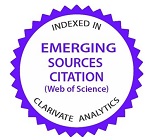Abstract
To develop trainings on the implementation of smart healthy age-friendly environments for people who aim to support, for example, their parents, their neighbours or local community, there are precautionary measures that have to be taken into account: the role of the facilitator (volunteer or self-employed), the level of skills, the needs of the end-users, training content and methodologies together with the sustainability of the learning. This article examines these aspects, based on desk research and expert interviews in the Smart Healthy Age-Friendly Environments (SHAFE) fields
Recommended Citation
Van Staalduinen, Willecke
(2020)
"Learning to implement Smart Healthy Age-Friendly Environments,"
Translational Medicine @ UniSa: Vol. 23
:
Iss.
4
, Article 21.
Available at:
https://doi.org/10.37825/2239-9747.1021
Creative Commons License

This work is licensed under a Creative Commons Attribution 4.0 License.
Included in
Health Communication Commons, Life Sciences Commons, Medicine and Health Sciences Commons




